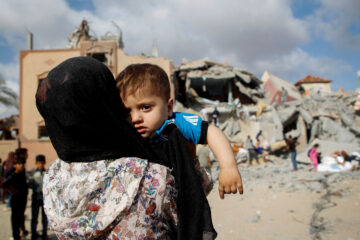Three Key Policy Issues and Strategies for Israeli-Palestinian Peace
In the Israeli-Palestinian conflict, there are three key policy angles that are currently not being touched upon by decision-makers: military disproportionality, religion and peacemaking, and political inclusion patterns. By not prioritizing these key policy concerns, it’s hard to envision brokered peace in this conflict, given its history and its strong polarizing potential.
Unlike many accounts, organized violent behavior in the Israel-Palestine conflict is not one-sided. This is not to say that the parties’ military capabilities are equal. According to the Stockholm International Peace Research Institute (SIPRI), Israel spent $16 billion on its military in 2013. In contrast, the Palestinian Authority’s entire budget for 2013 amounted to $3.9 billion. Despite the clear military disproportionality, it’s wrong to argue that aggressive behavior is one-sided, or that there is only one victimized group. Both sides have engaged in military action, though proportionate with their armies’ capacities.
Given the heavy military unevenness featured in this conflict, there needs to be a stronger focus on issues like demobilization. While Egypt’s proposed ceasefire would help facilitate a temporary period of reflection and provision of humanitarian aid, it may also allow regrouping and rearming on both sides. A ceasefire would not affect the parties’ overall capacity to wage war, especially if each party perceives that a military victory is attainable. A focus on demobilization affects the direct costs of waging war, increasing the expenses connected with regrouping and remobilizing, which may reduce the likelihood of war recurrence.
In terms of how the conflict has been explained in policy circles, the two-state solution advocated by many actors, including the US, is built on the belief that Israeli-Palestinian hostilities are based solely on territorial claims. While this remains true in conventional academic and policy terms, there is a problem with approaching this issue on territorial considerations alone.
Religion plays a key role both in the development of war rationale, and on the structural make-up of Israel\’s and Palestine’s social and political infrastructure. At the core of this conflict, legal claims over territory are tightly intertwined with religious history. Any peace plan that tries to bridge these territorial claims with a two-state solution must take into account the religious component. As Yehezkel Landau argues in his 2003 United States Institute of Peace research report on religious peacemakers in Israel and Palestine, religious traditions are paramount for the identity-building process of both Israel and Palestine, deeming them inseparable from most aspects of everyday life. To adopt a secularized, Western conception of a peace solution would risk overlooking the important connections that exist between religion and both parties’ claims over territory.
Conventional views of political inclusion are present throughout the currently proposed solutions for the Israeli-Palestinian conflict. When the Oslo Accords were signed in 1993, inclusion in the peace process was based on the idea that two negotiating parties were enough to ensure legitimacy and representativeness of the peace deliberations. By initially bringing together individuals close to Israeli and Palestinian Liberation Organization (PLO) decision-makers, a proper peace process was allowed to transition towards a formal peace agreement. This two-party exclusivity reflected the perceived dual nature of the conflict at that time (though it did exclude the most radical settlers and Islamists, who then engaged in enough spoiler attacks to derail the process).
The current state of the conflict is substantially different from that of the 1980s-1990s. There are more stakeholders on both sides of the conflict. Since Hamas’ rise to power in 2007, the political insurgency of Fatah, and an abundant increase of civil society groups in Palestine, the PLO is no longer the primary advocate of Palestinian interests. Similarly, on the Israeli side, Prime Minister Benjamin Netanyahu’s coalition government is a mosaic of different political groups, some of which oppose peace talks with Palestine. To craft conflict resolution plans without addressing the plurality of stakeholders in peace would be unwise, and would lead to continued stalls in the process.
Given the disproportionate military capabilities of Israel and Palestine, the undervalued religious aspect of the conflict, and inadequate political inclusion, there are several peacemaking strategies that policy makers should consider.
First, conventional Western peace models need to be replaced by locally based solutions. Religion, ever-present in the region, is a severely misunderstood and understudied variable in this conflict. Religion must be a central component in any peace initiative, and it’s inclusion needs to be initiated locally by groups and individuals better acquainted with religious discourse and its influence on political and social institutions.
Second, any peace initiative must also include non-combatant groups. Military and political classes have traditionally dominated peace processes, but they have also been the ones with the highest likelihood of abandoning the peace agenda. By including non-combatant civil society groups in peace processes, such as community leaders and non-governmental organizations, decision-making power is decentralized and may prevent disruption of peacemaking.
Including civil society in peacemaking processes reflects a yet-to-be recognized reality of war: combatant groups are not the only stakeholders in conflict zones. Wars, in the Middle East and elsewhere, are not confined to two warring parties; they also affect non-combatant groups and individuals – legitimate stakeholders of war. Peace processes generally seek overarching social and political changes, which need to be agreed-upon by those most affected by the changes – civil society groups and individuals.
Space for dialogue still remains in this conflict, but conventional peace wisdom needs to be revisited, challenged and adjusted to the changing realities in both Israel and Palestine.
The views expressed in this article are the author\’s own and do not necessarily reflect The Times Of Earth\’s editorial policy.










